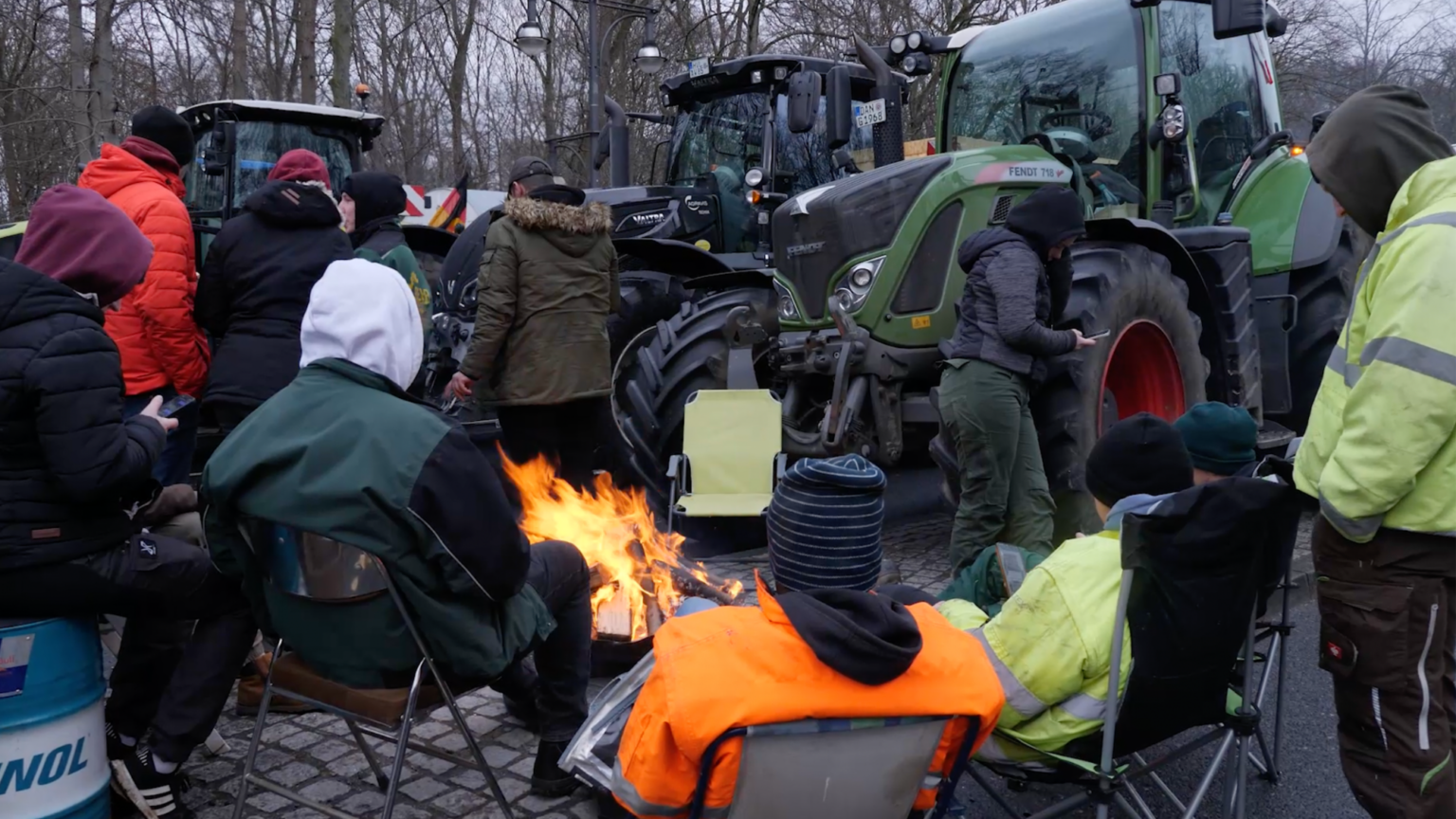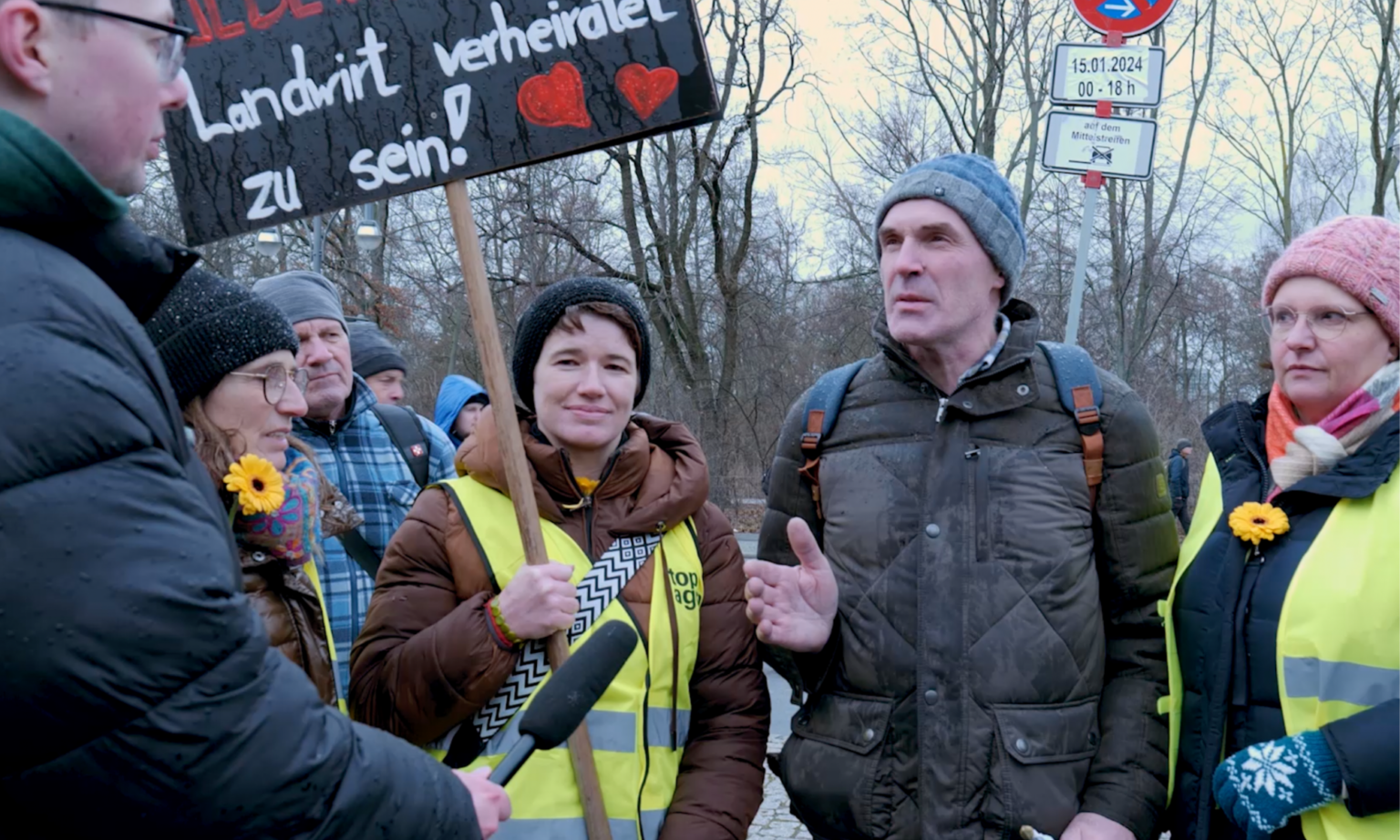‘I want a total change to the system’
spiked meets the German farmers and truckers revolting against the green elites.

Watch our video report from Berlin here.
‘You get the feeling that farmers are not wanted in Germany. They want to abolish us’, says Katrin. She’s a young German farmer who, along with her family, 30,000 other people and 5,000 tractors, descended on Berlin on Monday, capping off a week of nationwide demonstrations that blocked roads, brought life to a standstill and reminded the German political class why it’s best not to get on the wrong side of people who operate large machinery.
The spark for the protests was government plans to abolish tax breaks on agricultural diesel and introduce new taxes on farm vehicles, which would cost farmers, on average, €4,000 each per year. But walking along the columns of tractors parked up between the Brandenburg Gate and the Victory Column on Monday – where many farmers had been camped out for days; drinking beer, barbecuing sausages and huddling around fires – it’s clearly so much deeper than that. As Katrin puts it: ‘More and more is being taken away from farmers. We’ve had enough.’
Hannah Timmermann, an organic farmer from just outside Hamburg, spells out the catastrophic impact years of bad government policy has had on German agriculture. ‘I’m not sure if it’s the actual number now, but more or less 10 farms per day die because of the sum of many, many bad decisions’, she says. The stat checks out. According to German government figures, 10 farms per day went bust over the past decade. ‘My farm, my family farm for 10 generations, we are in danger of not existing anymore, of extinction’, she adds.
So, what’s been driving this apparent act of national self-harm? According to the farmers, it’s a combination of how out-of-touch the Berlin and Brussels elites are from farming communities – meaning they are blissfully unaware of how mad and unworkable their highfalutin policies are – and the ideology that fuels said highfalutin policies. Namely, environmentalism. Regulations on pesticides and fertilisers have become ever tighter, slashing crop yields in the process. Meanwhile, huge swathes of agricultural land have been put aside for solar – an unreliable energy source at the best of times, but particularly nonsensical in the hardly sun-drenched Germany. ‘Greens are the worst thing that could happen to agriculture’, says Katrin’s father.

In taking on greenism, the farmers’ revolt is resonating well beyond farmers themselves. Germany has more wind and solar farms than almost any other country in Europe, and higher energy prices than almost any other country in Europe. The two are not unrelated. Ordinary Germans have been forced to pay the price for successive governments’ green delusions, compounded by a bizarre allergy to nuclear power and the sudden withdrawal of the Russian gas Germany had come to rely on. This is part of the reason why support for the farmers has been remarkably high. A recent survey carried out by the Berliner Zeitung newspaper found that 65 per cent of respondents back the protests. On Monday, bike-riding, bespectacled Berliners waved at the blokes sitting atop their tractors. There’s a palpable sense that the farmers are standing up for everyone.
Hagen, a healthcare worker with a little braid dangling from his beard, has travelled from Dresden to show his support. He’s holding a sign, saying ‘First the farmer dies and then the country dies’ and railing against ‘Laws and rules without reason’. ‘This is what we are currently experiencing in Germany. We are inundated with laws and rules. There are new ones every week’, he tells me. ‘Green ideology is not inherently wrong, but we have lost our sense of proportion. Everything is now regulated according to green ideology, whether that makes sense or not.’
Hauliers, who are themselves agitating against a hike in road tax, have backed the farmers, too. Thousands of trucks rolled into Berlin alongside the tractors on Monday. One of them was driven into town by Dennis. ‘I’m not only a truck driver, I’m a customer as well’, he says, pointing to the mess the economy is in. He laments that ‘there is no possibility even to discuss’ green policies. ‘Things are wrong here in this country. I want a total change to this system… I’m looking forward to a more open society with lots of discussion.’
Naturally, the German elites have completely shunned that discussion. Instead, they’ve dismissed the farmers as ‘far right’. Because of course they have. Ahead of last week’s protests German chancellor Olaf Scholz – the Social Democratic leader of the fractious and unpopular coalition government – warned of ‘extremists’ jumping on the protests to ‘stoke rage’. There is constant talk in the media of right-wing populists Alternative für Deutschland or even full-blown neo-Nazis ‘hijacking’ the movement.
It’s all a transparent attempt to demonise the farmers and warn people away from joining them. Dennis, for one, is having none of it. ‘It’s totally bullshit’, he says. ‘It’s just a framing from the government and our mainstream media.’ Nor is Hagen. ‘As soon as the farmers became active, they were framed as far right and placed in the right-wing corner. They don’t belong there’, he says. All indications are he is correct. Farmers tend to be centre-right Christian democrats. At the demo, there isn’t a single AfD flag in sight. The German Farmers’ Association, the main organiser of the protests, has also come down hard on any attempts at infiltration, I’m told. While the AfD has certainly tried to glom on to the protests, the farmers have rebuffed its rather embarrassing advances, which are even more unlikely to succeed given the party’s previous opposition to agricultural subsidies.

While the farmers are far from a den of ‘extremists’, as Scholz would have it, they certainly are full of ‘rage’ – for him and his coalition. The government offered concessions to the farmers earlier this month, but this failed to stave off the protests. When finance minister Christian Lindner – leader of the neoliberal Free Democratic Party, the most anti-subsidy wing of the three-party coalition government – attempted to address the farmers on Monday he was booed off stage. It seems that implying your opponents are fascists while simultaneously seeking to negotiate with them is not a winning strategy. Who knew?
But this revolt is also about so much more than subsidies. While the German Farmers’ Association has tried to play nice – its president, Joachim Rukwied, tried to quiet down the crowds to allow Lindner to speak – rank and file farmers are calling for the government to fall. As spiked’s Germany correspondent, Sabine Beppler-Spahl, observes to me: ‘People are saying the government has no legitimacy at all. And that’s quite a new thing.’
Among the protesters, there’s a whiff of revolution – as well as barbecued Wurst – in the air. Not a violent, far-right revolution, of course, but a peaceful, populist one – against the anti-democracy and delusions of the establishment. Across the West, we’re seeing people who actually serve society – the farmers, the truck drivers; the people who know where the food and fuel and electricity comes from – begin to rise up against the green elites, to gently remind their rulers that society cannot function without them. Even in Germany – for decades written off as the quiet, ‘consensual’ nation; the one that ‘doesn’t do populism’ – people have had enough. Those who have long been ignored and demonised, and told to make do with less for the sake of the planet, are parking their tractors and trucks on the elite’s lawn. Long may it continue.
Tom Slater is the editor of spiked.
Watch our video report from Berlin:
Pictures by: spiked.
To enquire about republishing spiked’s content, a right to reply or to request a correction, please contact the managing editor, Viv Regan.










Comments
Want to join the conversation?
Only spiked supporters and patrons, who donate regularly to us, can comment on our articles.